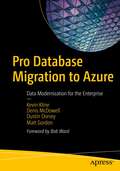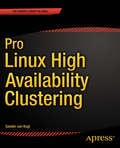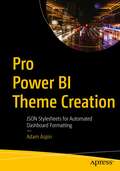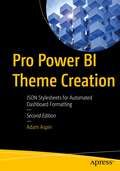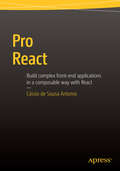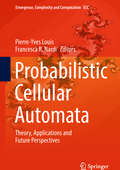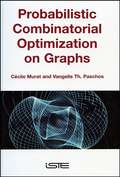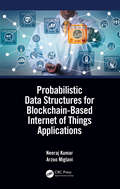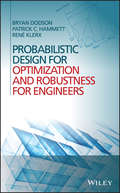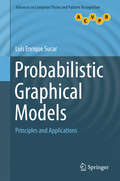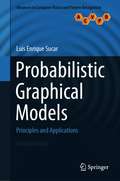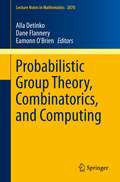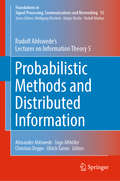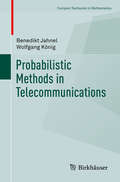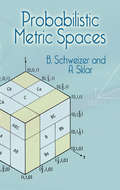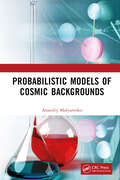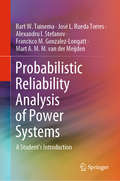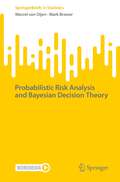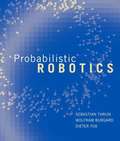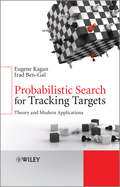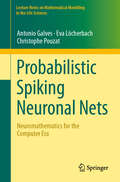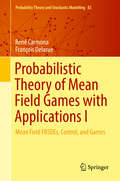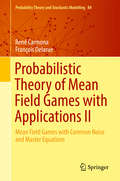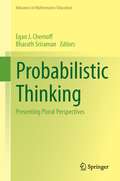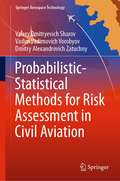- Table View
- List View
Pro Database Migration to Azure: Data Modernization for the Enterprise
by Kevin Kline Matt Gordon Denis McDowell Dustin DorseyMigrate your existing, on-premises applications into the Microsoft Azure cloud platform. This book covers the best practices to plan, implement, and operationalize the migration of a database application from your organization’s data center to Microsoft’s Azure cloud platform.Data modernization and migration is a technologically complex endeavor that can also be taxing from a leadership and operational standpoint. This book covers not only the technology, but also the most important aspects of organization culture, communication, and politics that so frequently derail such projects. You will learn the most important steps to ensuring a successful migration and see battle-tested wisdom from industry veterans. From executive sponsorship, to executing the migration, to the important steps following migration, you will learn how to effectively conduct future migrations and ensure that your team and your database application delivers on the expected business value of the project. This book is unlike any other currently in the market. It takes you through the most critical business and technical considerations and workflows for moving your data and databases into the cloud, with special attention paid to those who are deploying to the Microsoft Data Platform in Azure, especially SQL Server. Although this book focuses on migrating on-premises SQL Server enterprises to hybrid or fully cloud-based Azure SQL Database and Azure SQL Managed Instances, it also cover topics involving migrating non-SQL Server database platforms such as Oracle, MySQL, and PostgreSQL applications to Microsoft Azure.What You Will LearnPlan a database migration that ensures smooth project progress, optimal performance, low operating cost, and minimal downtimeProperly analyze and manage non-technical considerations, such as legal compliance, privacy, and team executionPerform a thorough architectural analysis to select the best Azure services, performance tiers, and cost-containment featuresAvoid pitfalls and common reasons for failure relating to corporate culture, intra-office politics, and poor communicationsSecure the proper executive champions who can execute the business planning needed for successApply proven criteria to determine your future-state architecture and your migration methodExecute your migration using a process proven by the authors over years of successful projectsWho This Book Is ForIT leadership, strategic IT decision makers, project owners and managers, and enterprise and application architects. For anyone looking toward cloud migration projects as the next stage of growth in their careers. Also useful for enterprise DBAs and consultants who might be involved in such projects. Readers should have experience and be competent in designing, coding, implementing, and supporting database applications in an on-premises environment.
Pro Linux High Availability Clustering
by Sander Van VugtPro Linux High Availability Clustering teaches you how to implement this fundamental Linux add-on into your business. Linux High Availability Clustering is needed to ensure the availability of mission critical resources. The technique is applied more and more in corporate datacenters around the world. While lots of documentation about the subject is available on the internet, it isn't always easy to build a real solution based on that scattered information, which is often oriented towards specific tasks only. Pro Linux High Availability Clustering explains essential high-availability clustering components on all Linux platforms, giving you the insight to build solutions for any specific case needed. In this book four common cases will be explained: Configuring Apache for high availabilityCreating an Open Source SAN based on DRBD, iSCSI and HA clusteringSetting up a load-balanced web server cluster with a back-end, highly-available databaseSetting up a KVM virtualization platform with high-availability protection for a virtual machine. With the knowledge you'll gain from these real-world applications, you'll be able to efficiently apply Linux HA to your work situation with confidence. Author Sander Van Vugt teaches Linux high-availability clustering on training courses, uses it in his everyday work, and now brings this knowledge to you in one place, with clear examples and cases. Make the best start with HA clustering with Pro Linux High Availability Clustering at your side
Pro Power BI Theme Creation: JSON Stylesheets for Automated Dashboard Formatting
by Adam AspinUse JSON theme files to standardize the look of Power BI dashboards and reports. This book shows how you can create theme files using the Power BI Desktop application to define high-level formatting attributes for dashboards as well as how to tailor detailed formatting specifications for individual dashboard elements in JSON files. Standardize the look of your dashboards and apply formatting consistently over all your reports. The techniques in this book provide you with tight control over the presentation of all aspects of the Power BI dashboards and reports that you create. Power BI theme files use JSON (JavaScript Object Notation) as their structure, so the book includes a brief introduction to JSON as well as how it applies to Power BI themes. The book further includes a complete reference to all the current formatting definitions and JSON structures that are at your disposal for creating JSON theme files. Finally, the book includes dozens of theme files, from the simple to the most complex, that you can adopt and adapt to suit your own requirements. What You Will LearnProduce designer output without manually formatting every individual visual in a Power BI dashboardStandardize presentation for families of dashboard typesSwitch presentation styles in a couple of clicksSave dozens, or hundreds, of hours laboriously formatting dashboardsDefine enterprise-wide presentation standardsRetroactively apply standard styles to existing dashboardsWho This Book Is ForPower BI users who want to save time by defining standardized formatting for their dashboards and reports, IT professionals who want to create corporate standards of dashboard presentation, and marketing and communication specialists who want to set organizational standards for dashboard delivery
Pro Power BI Theme Creation: JSON Stylesheets for Automated Dashboard Formatting
by Adam AspinUse JSON theme files to standardize the look of Power BI dashboards and reports. This book shows how you can create theme files using the Power BI Desktop application to define high-level formatting attributes for dashboards as well as how to tailor detailed formatting specifications for individual dashboard elements in JSON files. Standardize the look of your dashboards and apply formatting consistently over all your reports. The techniques in this book provide you with tight control over the presentation of all aspects of the Power BI dashboards and reports that you create. Power BI theme files use JSON (JavaScript Object Notation) as their structure, so the book includes a brief introduction to JSON as well as how it applies to Power BI themes. The book further includes a complete reference to all the current formatting definitions and JSON structures that are at your disposal for creating JSON theme files up to the May 2023 release of Power BI Desktop. Finally, the book includes dozens of theme files, from the simple to the most complex, that you can adopt and adapt to suit your own requirements. What You Will Learn Produce designer output without manually formatting every individual visual in a Power BI dashboardStandardize presentation for families of dashboard typesSwitch presentation styles in a couple of clicksSave dozens, or hundreds, of hours laboriously formatting dashboardsDefine enterprise-wide presentation standardsRetroactively apply standard styles to existing dashboards Who This Book Is For Power BI users who want to save time by defining standardized formatting for their dashboards and reports, IT professionals who want to create corporate standards of dashboard presentation, and marketing and communication specialists who want to set organizational standards for dashboard delivery.
Pro React
by Cássio de Sousa AntonioPro React teaches you how to successfully structure increasingly complex front-end applications and interfaces. This book explores the React library in depth, as well as detailing additional tools and libraries in the React ecosystem, enabling you to create complete, complex applications. You will learn how to use React completely, and learn best practices for creating interfaces in a composable way. You will also cover additional tools and libraries in the React ecosystem (such as React Router and Flux architecture). Each topic is covered clearly and concisely and is packed with the details you need to learn to be truly effective. The most important features are given no-nonsense, in-depth treatment, and every chapter details common problems and how to avoid them. If you already have experience creating front-end apps using jQuery or perhaps other JavaScript frameworks, but need to solve the increasingly common problem of structuring complex front-end applications, then this book is for you. Start working with React like a pro - add Pro React to your library today.
Probabilistic Cellular Automata: Theory, Applications And Future Perspectives (Emergence, Complexity And Computation Ser. #27)
by Pierre-Yves Louis Francesca R. NardiThis book explores Probabilistic Cellular Automata (PCA) from the perspectives of statistical mechanics, probability theory, computational biology and computer science. PCA are extensions of the well-known Cellular Automata models of complex systems, characterized by random updating rules. Thanks to their probabilistic component, PCA offer flexible computing tools for complex numerical constructions, and realistic simulation tools for phenomena driven by interactions among a large number of neighboring structures. PCA are currently being used in various fields, ranging from pure probability to the social sciences and including a wealth of scientific and technological applications. This situation has produced a highly diversified pool of theoreticians, developers and practitioners whose interaction is highly desirable but can be hampered by differences in jargon and focus. This book – just as the workshop on which it is based – is an attempt to overcome these difference and foster interest among newcomers and interaction between practitioners from different fields. It is not intended as a treatise, but rather as a gentle introduction to the role and relevance of PCA technology, illustrated with a number of applications in probability, statistical mechanics, computer science, the natural sciences and dynamical systems. As such, it will be of interest to students and non-specialists looking to enter the field and to explore its challenges and open issues.
Probabilistic Combinatorial Optimization on Graphs (Wiley-iste Ser.)
by Vangelis Th. Paschos Cécile MuratThis title provides a comprehensive survey over the subject of probabilistic combinatorial optimization, discussing probabilistic versions of some of the most paradigmatic combinatorial problems on graphs, such as the maximum independent set, the minimum vertex covering, the longest path and the minimum coloring. Those who possess a sound knowledge of the subject mater will find the title of great interest, but those who have only some mathematical familiarity and knowledge about complexity and approximation theory will also find it an accessible and informative read.
Probabilistic Data Structures for Blockchain-Based Internet of Things Applications
by Neeraj Kumar Arzoo MiglaniThis book covers theory and practical knowledge of Probabilistic data structures (PDS) and Blockchain (BC) concepts. It introduces the applicability of PDS in BC to technology practitioners and explains each PDS through code snippets and illustrative examples. Further, it provides references for the applications of PDS to BC along with implementation codes in python language for various PDS so that the readers can gain confidence using hands on experience. Organized into five sections, the book covers IoT technology, fundamental concepts of BC, PDS and algorithms used to estimate membership query, cardinality, similarity and frequency, usage of PDS in BC based IoT and so forth.
Probabilistic Design for Optimization and Robustness for Engineers
by Rene Klerx Patrick Hammett Bryan DodsonProbabilistic Design for Optimization and Robustness: Presents the theory of modeling with variation using physical models and methods for practical applications on designs more insensitive to variation. Provides a comprehensive guide to optimization and robustness for probabilistic design. Features examples, case studies and exercises throughout. The methods presented can be applied to a wide range of disciplines such as mechanics, electrics, chemistry, aerospace, industry and engineering. This text is supported by an accompanying website featuring videos, interactive animations to aid the readers understanding.
Probabilistic Graphical Models
by Luis Enrique SucarThis accessible text/reference provides a general introduction to probabilistic graphical models (PGMs) from an engineering perspective. The book covers the fundamentals for each of the main classes of PGMs, including representation, inference and learning principles, and reviews real-world applications for each type of model. These applications are drawn from a broad range of disciplines, highlighting the many uses of Bayesian classifiers, hidden Markov models, Bayesian networks, dynamic and temporal Bayesian networks, Markov random fields, influence diagrams, and Markov decision processes. Features: presents a unified framework encompassing all of the main classes of PGMs; describes the practical application of the different techniques; examines the latest developments in the field, covering multidimensional Bayesian classifiers, relational graphical models and causal models; provides exercises, suggestions for further reading, and ideas for research or programming projects at the end of each chapter.
Probabilistic Graphical Models: Principles and Applications (Advances in Computer Vision and Pattern Recognition)
by Luis Enrique SucarThis fully updated new edition of a uniquely accessible textbook/reference provides a general introduction to probabilistic graphical models (PGMs) from an engineering perspective. It features new material on partially observable Markov decision processes, graphical models, and deep learning, as well as an even greater number of exercises.The book covers the fundamentals for each of the main classes of PGMs, including representation, inference and learning principles, and reviews real-world applications for each type of model. These applications are drawn from a broad range of disciplines, highlighting the many uses of Bayesian classifiers, hidden Markov models, Bayesian networks, dynamic and temporal Bayesian networks, Markov random fields, influence diagrams, and Markov decision processes.Topics and features:Presents a unified framework encompassing all of the main classes of PGMsExplores the fundamental aspects of representation, inference and learning for each techniqueExamines new material on partially observable Markov decision processes, and graphical modelsIncludes a new chapter introducing deep neural networks and their relation with probabilistic graphical models Covers multidimensional Bayesian classifiers, relational graphical models, and causal modelsProvides substantial chapter-ending exercises, suggestions for further reading, and ideas for research or programming projectsDescribes classifiers such as Gaussian Naive Bayes, Circular Chain Classifiers, and Hierarchical Classifiers with Bayesian NetworksOutlines the practical application of the different techniquesSuggests possible course outlines for instructorsThis classroom-tested work is suitable as a textbook for an advanced undergraduate or a graduate course in probabilistic graphical models for students of computer science, engineering, and physics. Professionals wishing to apply probabilistic graphical models in their own field, or interested in the basis of these techniques, will also find the book to be an invaluable reference.Dr. Luis Enrique Sucar is a Senior Research Scientist at the National Institute for Astrophysics, Optics and Electronics (INAOE), Puebla, Mexico. He received the National Science Prize en 2016.
Probabilistic Group Theory, Combinatorics, and Computing
by Alla Detinko Dane Flannery Eamonn O'BrienProbabilistic Group Theory, Combinatorics and Computing is based on lecture courses held at the Fifth de Brún Workshop in Galway, Ireland in April 2011. Each course discusses computational and algorithmic aspects that have recently emerged at the interface of group theory and combinatorics, with a strong focus on probabilistic methods and results. The courses served as a forum for devising new strategic approaches and for discussing the main open problems to be solved in the further development of each area. The book represents a valuable resource for advanced lecture courses. Researchers at all levels are introduced to the main methods and the state-of-the-art, leading up to the very latest developments. One primary aim of the book's approach and design is to enable postgraduate students to make immediate use of the material presented.
Probabilistic Methods and Distributed Information: Rudolf Ahlswede’s Lectures on Information Theory 5 (Foundations in Signal Processing, Communications and Networking #15)
by Holger Boche Ingo Althöfer Christian Deppe Ulrich Tamm Alexander Ahlswede Rudolf Ahlswede Vladimir Blinovsky Ulrich Krengel Ahmed MansourThe fifth volume of Rudolf Ahlswede’s lectures on Information Theory focuses on several problems that were at the heart of a lot of his research. One of the highlights of the entire lecture note series is surely Part I of this volume on arbitrarily varying channels (AVC), a subject in which Ahlswede was probably the world's leading expert. Appended to Part I is a survey by Holger Boche and Ahmed Mansour on recent results concerning AVC and arbitrarily varying wiretap channels (AVWC). After a short Part II on continuous data compression, Part III, the longest part of the book, is devoted to distributed information. This Part includes discussions on a variety of related topics; among them let us emphasize two which are famously associated with Ahlswede: "multiple descriptions", on which he produced some of the best research worldwide, and "network coding", which had Ahlswede among the authors of its pioneering paper. The final Part IV on "Statistical Inference under Communication constraints" is mainly based on Ahlswede’s joint paper with Imre Csiszar, which received the Best Paper Award of the IEEE Information Theory Society. The lectures presented in this work, which consists of 10 volumes, are suitable for graduate students in Mathematics, and also for those working in Theoretical Computer Science, Physics, and Electrical Engineering with a background in basic Mathematics. The lectures can be used either as the basis for courses or to supplement them in many ways. Ph.D. students will also find research problems, often with conjectures, that offer potential subjects for a thesis. More advanced researchers may find questions which form the basis of entire research programs.
Probabilistic Methods in Telecommunications (Compact Textbooks in Mathematics)
by Wolfgang König Benedikt JahnelProbabilistic modeling and analysis of spatial telecommunication systems have never been more important than they are today. In particular, it is an essential research area for designing and developing next-generation communication networks that are based on multihop message transmission technology. These lecture notes provide valuable insights into the underlying mathematical discipline, stochastic geometry, introducing the theory, mathematical models and basic concepts. They also discuss the latest applications of the theory to telecommunication systems. The text covers several of the most fundamental aspects of quality of service: connectivity, coverage, interference, random environments, and propagation of malware. It especially highlights two important limiting scenarios of large spatial systems: the high-density limit and the ergodic limit. The book also features an analysis of extreme events and their probabilities based on the theory of large deviations. Lastly, it includes a large number of exercises offering ample opportunities for independent self-study.
Probabilistic Metric Spaces
by B. Schweizer A. SklarThis distinctly nonclassical treatment focuses on developing aspects that differ from the theory of ordinary metric spaces, working directly with probability distribution functions rather than random variables. The two-part treatment begins with an overview that discusses the theory's historical evolution, followed by a development of related mathematical machinery. The presentation defines all needed concepts, states all necessary results, and provides relevant proofs.The second part opens with definitions of probabilistic metric spaces and proceeds to examinations of special classes of probabilistic metric spaces, topologies, and several related structures, such as probabilistic normed and inner-product spaces. Throughout, the authors focus on developing aspects that differ from the theory of ordinary metric spaces, rather than simply transferring known metric space results to a more general setting.
Probabilistic Models of Cosmic Backgrounds
by Anatoliy MalyarenkoCombining research methods from various areas of mathematics and physics, Probabilistic Models of Cosmic Backgrounds describes the isotropic random sections of certain fiber bundles and their applications to creating rigorous mathematical models of both discovered and hypothetical cosmic backgrounds.Previously scattered and hard-to-find mathematical and physical theories have been assembled from numerous textbooks, monographs, and research papers, and explained from different or even unexpected points of view. This consists of both classical and newly discovered results necessary for understanding a sophisticated problem of modelling cosmic backgrounds.The book contains a comprehensive description of mathematical and physical aspects of cosmic backgrounds with a clear focus on examples and explicit calculations. Its reader will bridge the gap of misunderstanding between the specialists in various theoretical and applied areas who speak different scientific languages.The audience of the book consists of scholars, students, and professional researchers. A scholar will find basic material for starting their own research. A student will use the book as supplementary material for various courses and modules. A professional mathematician will find a description of several physical phenomena at the rigorous mathematical level. A professional physicist will discover mathematical foundations for well-known physical theories.
Probabilistic Reliability Analysis of Power Systems: A Student’s Introduction
by Francisco M. Gonzalez-Longatt Bart W. Tuinema Alexandru I. Stefanov José L. Rueda Torres Mart A. van der MeijdenThis textbook provides an introduction to probabilistic reliability analysis of power systems. It discusses a range of probabilistic methods used in reliability modelling of power system components, small systems and large systems. It also presents the benefits of probabilistic methods for modelling renewable energy sources. The textbook describes real-life studies, discussing practical examples and providing interesting problems, teaching students the methods in a thorough and hands-on way.The textbook has chapters dedicated to reliability models for components (reliability functions, component life cycle, two-state Markov model, stress-strength model), small systems (reliability networks, Markov models, fault/event tree analysis) and large systems (generation adequacy, state enumeration, Monte-Carlo simulation). Moreover, it contains chapters about probabilistic optimal power flow, the reliability of underground cables and cyber-physical power systems.After reading this book, engineering students will be able to apply various methods to model the reliability of power system components, smaller and larger systems. The textbook will be accessible to power engineering students, as well as students from mathematics, computer science, physics, mechanical engineering, policy & management, and will allow them to apply reliability analysis methods to their own areas of expertise.
Probabilistic Risk Analysis and Bayesian Decision Theory (SpringerBriefs in Statistics)
by Mark Brewer Marcel van OijenThe book shows how risk, defined as the statistical expectation of loss, can be formally decomposed as the product of two terms: hazard probability and system vulnerability. This requires a specific definition of vulnerability that replaces the many fuzzy definitions abounding in the literature. The approach is expanded to more complex risk analysis with three components rather than two, and with various definitions of hazard. Equations are derived to quantify the uncertainty of each risk component and show how the approach relates to Bayesian decision theory. Intended for statisticians, environmental scientists and risk analysts interested in the theory and application of risk analysis, this book provides precise definitions, new theory, and many examples with full computer code. The approach is based on straightforward use of probability theory which brings rigour and clarity. Only a moderate knowledge and understanding of probability theory is expected from the reader.
Probabilistic Robotics (Intelligent Robotics and Autonomous Agents)
by Wolfram Burgard Sebastian Thrun Dieter Fox<p>An introduction to the techniques and algorithms of the newest field in robotics. <p>Probabilistic robotics is a new and growing area in robotics, concerned with perception and control in the face of uncertainty. Building on the field of mathematical statistics, probabilistic robotics endows robots with a new level of robustness in real-world situations. This book introduces the reader to a wealth of techniques and algorithms in the field. All algorithms are based on a single overarching mathematical foundation. Each chapter provides example implementations in pseudo code, detailed mathematical derivations, discussions from a practitioner's perspective, and extensive lists of exercises and class projects. The book's Web site, www.probabilistic-robotics.org, has additional material. The book is relevant for anyone involved in robotic software development and scientific research. It will also be of interest to applied statisticians and engineers dealing with real-world sensor data.</p>
Probabilistic Search for Tracking Targets
by Eugene Kagan Irad Ben-GalPresents a probabilistic and information-theoretic framework for a search for static or moving targets in discrete time and space.Probabilistic Search for Tracking Targets uses an information-theoretic scheme to present a unified approach for known search methods to allow the development of new algorithms of search. The book addresses search methods under different constraints and assumptions, such as search uncertainty under incomplete information, probabilistic search scheme, observation errors, group testing, search games, distribution of search efforts, single and multiple targets and search agents, as well as online or offline search schemes. The proposed approach is associated with path planning techniques, optimal search algorithms, Markov decision models, decision trees, stochastic local search, artificial intelligence and heuristic information-seeking methods. Furthermore, this book presents novel methods of search for static and moving targets along with practical algorithms of partitioning and search and screening.Probabilistic Search for Tracking Targets includes complete material for undergraduate and graduate courses in modern applications of probabilistic search, decision-making and group testing, and provides several directions for further research in the search theory.The authors:Provide a generalized information-theoretic approach to the problem of real-time search for both static and moving targets over a discrete space.Present a theoretical framework, which covers known information-theoretic algorithms of search, and forms a basis for development and analysis of different algorithms of search over probabilistic space.Use numerous examples of group testing, search and path planning algorithms to illustrate direct implementation in the form of running routines.Consider a relation of the suggested approach with known search theories and methods such as search and screening theory, search games, Markov decision process models of search, data mining methods, coding theory and decision trees.Discuss relevant search applications, such as quality-control search for nonconforming units in a batch or a military search for a hidden target. Provide an accompanying website featuring the algorithms discussed throughout the book, along with practical implementations procedures.
Probabilistic Spiking Neuronal Nets: Neuromathematics for the Computer Era (Lecture Notes on Mathematical Modelling in the Life Sciences)
by Antonio Galves Eva Löcherbach Christophe PouzatThis book provides a self-contained introduction to a new class of stochastic models for systems of spiking neurons. These systems have a large number of interacting components, each one evolving as a stochastic process with a memory of variable length. Several mathematical tools are put to use, such as Markov chains, stochastic chains having memory of variable length, point processes having stochastic intensity, Hawkes processes, random graphs, mean field limits, perfect sampling algorithms, the Context algorithm, and statistical model selection.The book’s focus on mathematically tractable objects distinguishes it from other texts on theoretical neuroscience. The biological complexity of neurons is not ignored, but reduced to some of its main features, such as the intrinsic randomness of neuronal dynamics. This reduction in complexity aims at explaining and reproducing statistical regularities and collective phenomena that are observed in experimental data, an approach that leads to mathematically rigorous results. With an emphasis on a constructive and algorithmic point of view, this book is directed towards mathematicians interested in learning about stochastic network models and their neurobiological underpinning, and neuroscientists interested in learning how to build and prove results with mathematical models that relate to actual experimental settings.
Probabilistic Theory of Mean Field Games with Applications I: Mean Field FBSDEs, Control, and Games (Probability Theory and Stochastic Modelling #83)
by René Carmona François DelarueThis two-volume book offers a comprehensive treatment of the probabilistic approach to mean field game models and their applications. The book is self-contained in nature and includes original material and applications with explicit examples throughout, including numerical solutions.Volume I of the book is entirely devoted to the theory of mean field games without a common noise. The first half of the volume provides a self-contained introduction to mean field games, starting from concrete illustrations of games with a finite number of players, and ending with ready-for-use solvability results. Readers are provided with the tools necessary for the solution of forward-backward stochastic differential equations of the McKean-Vlasov type at the core of the probabilistic approach. The second half of this volume focuses on the main principles of analysis on the Wasserstein space. It includes Lions' approach to the Wasserstein differential calculus, and the applications of its results to the analysis of stochastic mean field control problems. Together, both Volume I and Volume II will greatly benefit mathematical graduate students and researchers interested in mean field games. The authors provide a detailed road map through the book allowing different access points for different readers and building up the level of technical detail. The accessible approach and overview will allow interested researchers in the applied sciences to obtain a clear overview of the state of the art in mean field games.
Probabilistic Theory of Mean Field Games with Applications II: Mean Field Games with Common Noise and Master Equations (Probability Theory and Stochastic Modelling #84)
by René Carmona François DelarueThis two-volume book offers a comprehensive treatment of the probabilistic approach to mean field game models and their applications. The book is self-contained in nature and includes original material and applications with explicit examples throughout, including numerical solutions. Volume II tackles the analysis of mean field games in which the players are affected by a common source of noise. The first part of the volume introduces and studies the concepts of weak and strong equilibria, and establishes general solvability results. The second part is devoted to the study of the master equation, a partial differential equation satisfied by the value function of the game over the space of probability measures. Existence of viscosity and classical solutions are proven and used to study asymptotics of games with finitely many players. Together, both Volume I and Volume II will greatly benefit mathematical graduate students and researchers interested in mean field games. The authors provide a detailed road map through the book allowing different access points for different readers and building up the level of technical detail. The accessible approach and overview will allow interested researchers in the applied sciences to obtain a clear overview of the state of the art in mean field games.
Probabilistic Thinking
by Bharath Sriraman Egan J. ChernoffThis volume provides a necessary, current and extensive analysis of probabilistic thinking from a number of mathematicians, mathematics educators, and psychologists. The work of 58 contributing authors, investigating probabilistic thinking across the globe, is encapsulated in 6 prefaces, 29 chapters and 6 commentaries. Ultimately, the four main perspectives presented in this volume (Mathematics and Philosophy, Psychology, Stochastics and Mathematics Education) are designed to represent probabilistic thinking in a greater context.
Probabilistic-Statistical Methods for Risk Assessment in Civil Aviation (Springer Aerospace Technology)
by Dmitry Alexandrovich Zatuchny Valery Dmitryevich Sharov Vadim Vadimovich VorobyovThis book analyses the models for major risks related to flight safety in the aviation sector and presents risk estimation methods through examples of several known aviation enterprises. The book provides a comprehensive content for professionals engaged in the development of flight safety regulatory framework as well as in the design and operation of ground-based or on-board flight support radio electronic systems. The book is also useful for senior students and postgraduates in aviation specialties, especially those related to air traffic management.
